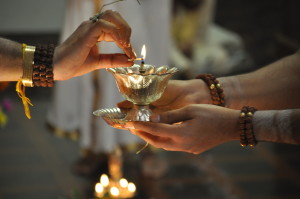
“So, what are you?”
So much is hidden in this one simple question. Most of us are on a quest to answer this for ourselves and for others. What defines your identity?
Okay, relax, this is not going to be about an existential crisis. We’re just talking about our cultural identity here. Many of us growing up in the West have had an identity crisis, being pulled to opposite sides, wanting to validate our western identity and “culture” while not losing our roots. When confronted with questions about our religion, we usually respond with something vague like:
“Well, I’m Hindu. But I’m not really religious, I’m just spiritual.”
I’m sure we’ve all had this conversation in one form or the other with our non-Hindu (sometimes even Hindu) friends. It’s the perfect response because it serves a dual purpose. We don’t have to explain our beliefs to anyone and don’t have to commit to anything nor do we have to completely give up a piece of our identity. To be honest, we grew up confused about what exactly our beliefs were so we definitely couldn’t verbalize it to others. In our minds, it was just a set of dogmas and meaningless rituals that restricted our Western lifestyle. We couldn’t eat beef and we had to say some shloka every night before bed because that’s what our parents told us to do. Going to temple meant just running through the motions of pretending to be pious, though we weren’t really even sure we felt any real connection to God.
Looking back on it, I realize my ideas of God and religion were so distorted. Many of my spiritual practices were either done out of fear or social obligation. They had no meaning even though my parents took the time to explain everything. I didn’t understand how praying to a deity at the temple or reciting a mantra when I wake up was going to help me achieve anything. In fact, it really hadn’t. In the past, I had prayed for things that I didn’t get which only led to more insecurities about religion.
After meeting Swamiji (our Guru, Sri Paramahamsa Nithyananda Swami), we were able to realize the true beauty of Hinduism and more importantly, we learned to fully embrace our roots. Hinduism is built to constantly expand us, not restrict us. The purpose is to help us realize our highest possibility and not be limited to our own narrow views of ourselves. Prayer is not about negotiating with God but about losing yourself in God. It’s about experiencing a space of powerful oneness from which you can manifest anything, not freeing yourself from guilt.
Recently, we’ve had a cognitive shift in the way we see ourselves, one that enables us to seek answers and pursue growth. The idea of God and religion has completely evolved for us. We have been able to embrace a whole new inspiration for life. So this blog will aim to set the context straight. We will discuss how the context for various practices (prayer, vegetarianism, rituals, etc.) has shifted for us. We hope that by writing about our journey, we can empower others to embrace what Hinduism has to offer.
Thank you to whoever made it to the end of this post. Hopefully, you’ll continue to read our blog and don’t think that we’re totally crazy. We’ll try our best to be candid and keep you interested.
Questions? Comments? Concerns?
Leave them below. We’d love to hear from you.